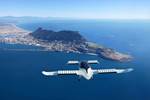EASA introduces Certification Readiness Level scale for aircraft technologies
Developed in partnership with Clean Aviation and the CONCERTO project, the CRL scale will provide a digital certification framework to shorten time to market for disruptive technologies with improved safety.
Source | Introducing the CRL Scale
The European Union Aviation Safety Agency (EASA, Cologne, Germany) has announced development of a new Certification Readiness Level (CRL) scale in partnership with the Clean Aviation Joint Undertaking within the CONCERTO project. The CRL scale is designed to assess the future certifiability of an innovative concept of operation, business model and/or product/system, while engaging progressively with aviation authorities to facilitate future shared oversight activities.
The CRL scale is offering a crucial complement to the traditional Technology Readiness Levels (TRLs). It includes nine main steps summarized as follows:
Source | CONCERTO booklet
The CRL scale will be further detailed as part of future certification methods and means of compliance developed within the CONCERTO project. However, EASA encourages any applicant, technology developer and/or system supplier to familiarize themselves with this approach when measuring the growing level of maturity of product embedding innovative technology and/or concepts of operations (learn more).
Source | CONCERTO project overview
CONCERTO is an EU-funded project under the Clean Aviation Joint Undertaking program. Its objective is to develop technical data which will constitute draft regulatory material for future breakthrough innovations. Its aims are twofold:
- Develop a comprehensive set of regulations on certification of aircraft, together with a preliminary description of methods of compliance (MoCs) applicable to the three “thrusts” of Clean Aviation:
– Hybrid electric regional aircraft
– Ultra-efficient short- and short-medium-range aircraft
– Disruptive technologies to enable hydrogen-powered aircraft. - Assess the feasibility of a digital certification framework to support collaboration and model-based certification.
Certification is expected to improve safety, while shortening time to bring new, safe products to market and into service and maintaining European leadership and competitiveness. The results are expected to be transposable and scalable to different product lines and aircraft segments such as general aviation, rotorcraft, business jets and commercial medium-long range, affecting the complete fleet.
The composition of the project’s consortium reflects a mix of aircraft manufacturers, engine manufacturers, equipment manufacturers, research centers, universities, SME and PLM experts. Playing a pivotal role between innovation and the development of safety, security or environmental protection standards, EASA experts are involved, acting together with industrial and research technical teams for the conception, endorsement of new solutions and enhancement of the international community acceptance.
Source | CONCERTO project, Methodology
Innovation Services
Innovation Services are offered by EASA to external stakeholders to support the introduction of new technologies or innovative solutions. Stakeholders interested in receiving technical advice services prior to or outside of an actual certification process conducted in accordance with Commission Regulation (EU) No 748/2012 and its Annex I (Part 21) can apply for Innovation Services.
Innovation services are one of the tools in EASA Research and Innovation portfolio, and contribute to building for industry a regulatory framework that allows — with legal certainty — to develop new ideas and to demonstrate that what industry develops is safe.
Related Content
-
Next-generation airship design enabled by modern composites
LTA Research’s proof-of-concept Pathfinder 1 modernizes a fully rigid airship design with a largely carbon fiber composite frame. R&D has already begun on higher volume, more automated manufacturing for the future.
-
Cryo-compressed hydrogen, the best solution for storage and refueling stations?
Cryomotive’s CRYOGAS solution claims the highest storage density, lowest refueling cost and widest operating range without H2 losses while using one-fifth the carbon fiber required in compressed gas tanks.
-
Plant tour: Middle River Aerostructure Systems, Baltimore, Md., U.S.
The historic Martin Aircraft factory is advancing digitized automation for more sustainable production of composite aerostructures.




















